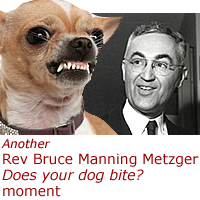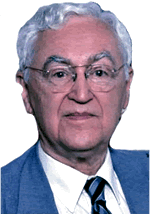|
And yet ...>>
"Matthew can scarcely
be the final author"?!
If you're like me, you read that sentence
and the scarcely makes you think, "Well,
scarcely isn't for-sure, so Matthew might
have been the author," and the final
makes you think, "Matthew might have been
the author right before the final author."
And you'd be wrong. In the middle of several
pages of hard facts demonstrating that the disciple
Matthew did not write the Gospel of Matthew,
Revered Metzger has just left you thinking he
probably did. Why, Bruce? Why would you do that?
|
In
the case of the first Gospel, the apostle
Matthew can scarcely be the final author;
for why should one who presumably had been an
eyewitness of much that he records depend so
slavishly upon the account given by Mark, who
had not been an eyewitness?
Metzger,
Bruce M. The Canon of the New Testament:
Its Origin, Development, and Significance
(1997), pg. 96

|
 Guy
walks into a bar and sits down next to Bruce
Manning Metzger and a dog.
Guy
walks into a bar and sits down next to Bruce
Manning Metzger and a dog.

 admitted
the Gospel of Matthew was written anonymously,
and here he's admitting the church legend that
the disciple Matthew wrote the gospel is impossible—because
the Gospel of Matthew gets
much of its material from the the Gospel
of Mark, and the traditional Christian
legend says Matthew did know
Jesus, but Mark did not. A
guy (Matthew) who did know Jesus wouldn't
get his Jesus stories from a guy who didn't
(Mark). So, whoever wrote the Gospel of Matthew
cannot have been the disciple Matthew. Is your
head spinning?
admitted
the Gospel of Matthew was written anonymously,
and here he's admitting the church legend that
the disciple Matthew wrote the gospel is impossible—because
the Gospel of Matthew gets
much of its material from the the Gospel
of Mark, and the traditional Christian
legend says Matthew did know
Jesus, but Mark did not. A
guy (Matthew) who did know Jesus wouldn't
get his Jesus stories from a guy who didn't
(Mark). So, whoever wrote the Gospel of Matthew
cannot have been the disciple Matthew. Is your
head spinning? This
is all standard academic stuff. Reverend Metzger
can't have his bible book taken seriously if
he leaves it out. Anyway, in this passage I'm
about to quote from, Reverend Metzger has just
admitted the Gospel of Matthew was written anonymously.
And, he says, the church's legend about the
disciple Matthew being the author is impossible.
This
is all standard academic stuff. Reverend Metzger
can't have his bible book taken seriously if
he leaves it out. Anyway, in this passage I'm
about to quote from, Reverend Metzger has just
admitted the Gospel of Matthew was written anonymously.
And, he says, the church's legend about the
disciple Matthew being the author is impossible.